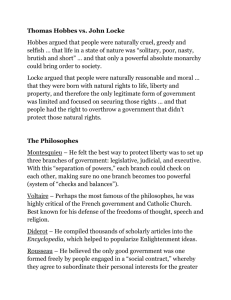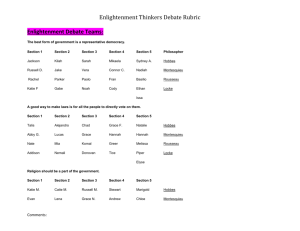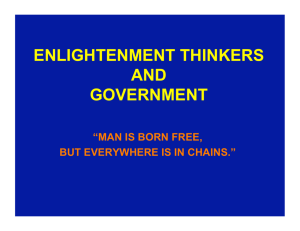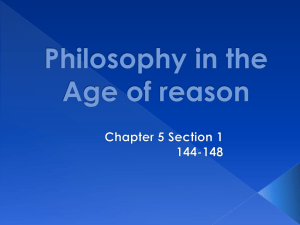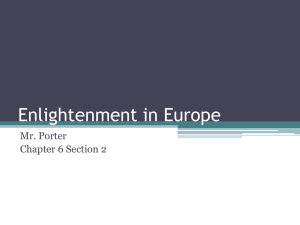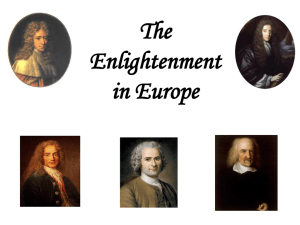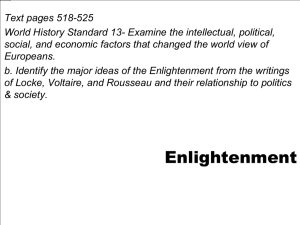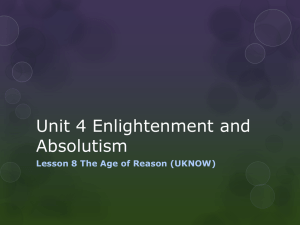Ch5Sec1
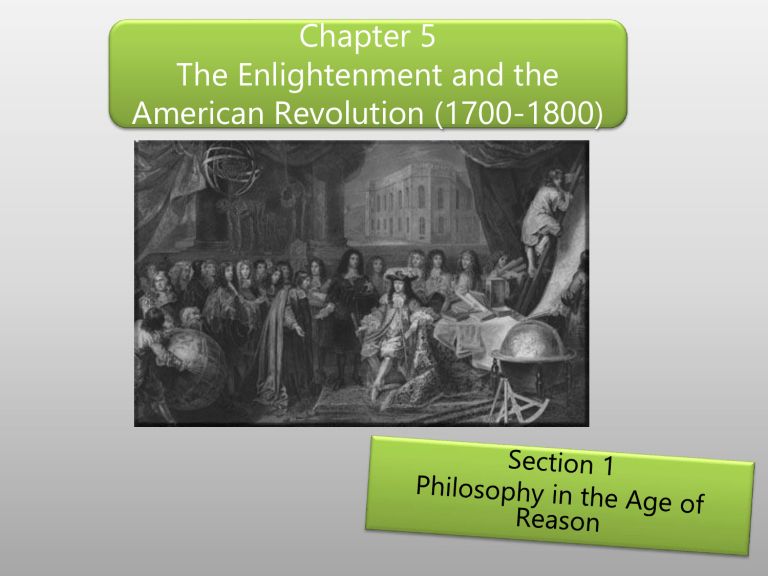
Chapter 5
The Enlightenment and the
American Revolution (1700-1800)
Scientific Revolution Sparks the Enlightenment
By the early 1700s, European thinkers felt that nothing was beyond the reach of the human mind. Through the use of reason, these thinkers believed that people and governments could solve every social, political, and economic problem. These writers and philosophers thought they could change the world.
The Scientific Revolution of the 1500s and 1600s had transformed the way people in Europe looked at the world. In the 1700s, other scientists expanded European knowledge. For example, Edward
Jenner developed a vaccine against smallpox, a disease whose path of death spanned the centuries.
Scientific success convinced educated Europeans of the power of human reason. Natural law, are rules discoverable by reason.
Enlightenment thinkers wanted to use natural law to better understand social, economic, and political problems. Using the methods of the new science, reformers set out to study human behavior and solve the problems of society.
The Scientific Revolution led to another revolution in thinking known as the Enlightenment.
Hobbes and Locke Have Conflicting Views
Thomas Hobbes and John Locke, two 17 th century English thinkers, set forth ideas that were to become key to the Enlightenment.
Both men lived through the upheavals of the English Civil War.
Yet, they came to very different conclusions about human nature and the role of government.
Hobbes Believes in Powerful GovernmentThomas Hobbes outlined his ideas in a paper called,
Leviathan
. In it, he argued that people were naturally cruel, greedy and selfish. If not strictly controlled they would fight and rob others. He thought that life without laws or other controls would be chaos.
To avoid a life of chaos, Hobbes believed that people entered into a social contract. This contract was an agreement that required people to give up their total freedom in exchange for an organized society. He believed that only a powerful government could ensure an orderly society. For Hobbes this could only be an absolute monarchy, which could impose order and demand obedience.
Locke Advocates Natural RightsJohn Locke had a more optimistic view of human nature. He thought people were basically reasonable and moral. He also thought people should have certain natural rights (rights that they had from birth to death). For example, the right to life, liberty, and prosperity.
Locke wrote a paper titled,. In it he argued that people formed governments
Two Treaties of Government
to protect their natural rights. In his opinion, the best kind of government had limited power and was accepted by all citizens. Locke rejected absolute monarchy. Locke believed that a government had an obligation to the people that it governs. Locke went even further when he stated that people have a right to overthrow a government that fails to give these obligations to the people.
The Philosophes
In the 1700s, a group of Enlightenment thinkers in France applied the methods of science to understand and improve society. They believed that the use of reason could lead to reforms of government, law, and society. These thinkers were called philosophes. Their ideas soon spread beyond France and even beyond Europe.
Montesquieu - Baron de Montesquieu, an early and influential thinker helped to advance the idea of Separation of Powers. He studied the governments of Europe, from Italy to England. He read about ancient and medieval Europe, and learned about
Chinese and Native American cultures. His sharp criticism of absolute monarchy would open doors for later debate.
Montesquieu wrote about this idea in a paper titled,
The Spirit of the Laws
. The paper stated that the best way to protect liberty was to divide the various functions and powers of government among three branches (Legislative, Executive, Judicial).
VoltaireVoltaire used wit and sarcasm as a weapon to expose the abuses of his day. He targeted corrupt officials and idle aristocrats, battled against the slave trade, and religious prejudice.
Voltaire offended both the French government and the Catholic
Church. He was eventually imprisoned and forced into exile.
Diderot - Denis Diderot worked for years to produce a 28-volume set of books called the Encyclopedia. As the editor, Diderot did more than just compile articles. His purpose was to change the general way of thinking by explaining ideas on topics such as government, philosophy, and religion. His encyclopedias included articles by leading thinkers of the day like Montesquieu and
Voltaire.
The French government and the Roman Catholic Church argued that the Encyclopedias were an attack on public morals. Despite their disapproval, more than 4,000 copies were printed between
1751 and 1789. When translated into other languages, the
Encyclopedia helped spread Enlightenment ideas throughout
Europe and across the Atlantic Ocean to the Americas.
RousseauJean-Jacques Rousseau believed that people in their natural state were basically good. He believed that this natural innocence was corrupted by the evils of society, especially the unequal distribution of property. In 1762, Rousseau set forth his ideas about government and society in
The Social Contract
. He felt that society placed too many limitations on people’s behavior.
He believed that some controls were necessary, but that they should be minimal. Additionally, only governments that had been freely elected should impose these controls.
Women Challenge the Philosophes
The Enlightenment slogan “free and equal” did not apply to women. Though the philosophes said women had natural rights, their rights were limited to the areas of home and family.
By the mid- to late-1700s, a small but growing number of women protested this view. These women argued that they were being excluded from the social contract. At the time their views were often ridiculed and condemned.
Wollstonecraft was a well-known British social critic. He felt that a woman should be able to decide what was in her own interest without depending on her husband. In 1792, she published A
Vindication of the Rights of Woman. In it, she called for equal education for girls and boys. Only education, she argued could give women the tools they needed to participate equally with men in public life.
New Economic Thinking
French thinkers known as physiocrats focused on economic reforms. Like the philosophes, physiocrats based their thinking on natural laws. The physiocrats claimed that their rational economic system was based on the natural law of economics.
Laissez Faire Replaces Mercantilism – Physiocrats rejected mercantilism which required government regulation of the economy to achieve a favorable balance of trade. Instead they believed in a policy called laissez faire which allowed businesses to operate with little or no government interference. They also supported free trade and opposed tariffs.
Smith Argues for a Free MarketEconomist Adam Smith wrote,
The Wealth of Nations
which argued that the free market should be allowed to regulate business activity. He believed that manufacturing, trade, & wages were all linked to supply and demand. He supported laissez faire but believed that the
Government had a duty to protect society.
